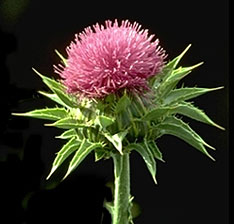 A friend asked me to look into CAM treatments for fatty liver disease. I did, but found little to support milk thistle — the most often discussed CAM treatment.
A friend asked me to look into CAM treatments for fatty liver disease. I did, but found little to support milk thistle — the most often discussed CAM treatment.
The ripe seeds of the milk thistle plant (Silybum marianum) are used medicinally. One of the most important constituents of milk thistle is silymarin, which itself consists of several constituents, including silybinin (aka, silibinin, silybin). There are no shortage of data here, here, here, and elsewhere in animal models supporting the potential role of silybinin to treat or prevent liver disease.
Unfortunately, this has not translated into successful human studies. For example, in the Cochrane Collaboration review, low-quality trials suggested beneficial effects. However, when high quality trials or all trials were combined there was no significant effect of milk thistle on mortality or complications of liver diseases in patients with alcoholic and/or hepatitis B or C liver diseases.
MayoClinic.com makes the following assessments.
- Chronic hepatitis: more research needed
- Cirrhosis: better research necessary
- Active viral hepatitis: cannot recommend
- Liver cancer: only one case report
- Live damage from drugs and toxins: not enough scientific evidence
Dr. Thomas Strickland from the University of Maryland School of Medicine has studied the role of silymarin in preventing complications of chronic hepatitis virus infection. He believes that the dose of milk thistle used in clinical trials might be too low. But before everyone goes and doubles their dose, remember that Dr. Strickland thinks this might be the case. It’s not proven.
On the positive side, milk thistle is well tolerated in recommended doses. Some patients have experienced stomach upset, headache, and itching. Milk thistle may lower blood sugar levels. For more information, go to the MayoClinic.com.
7/29/06 16:04 JR